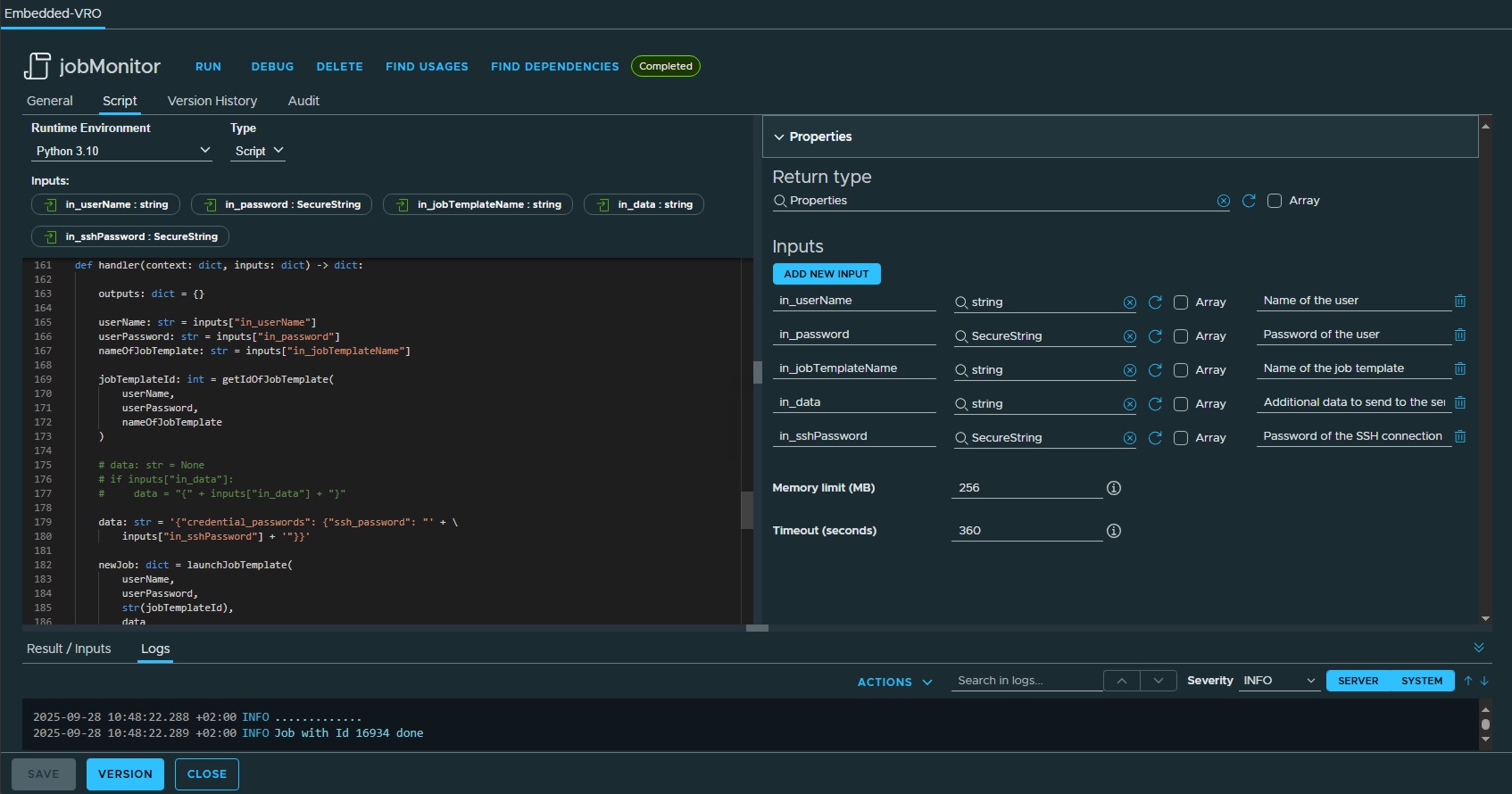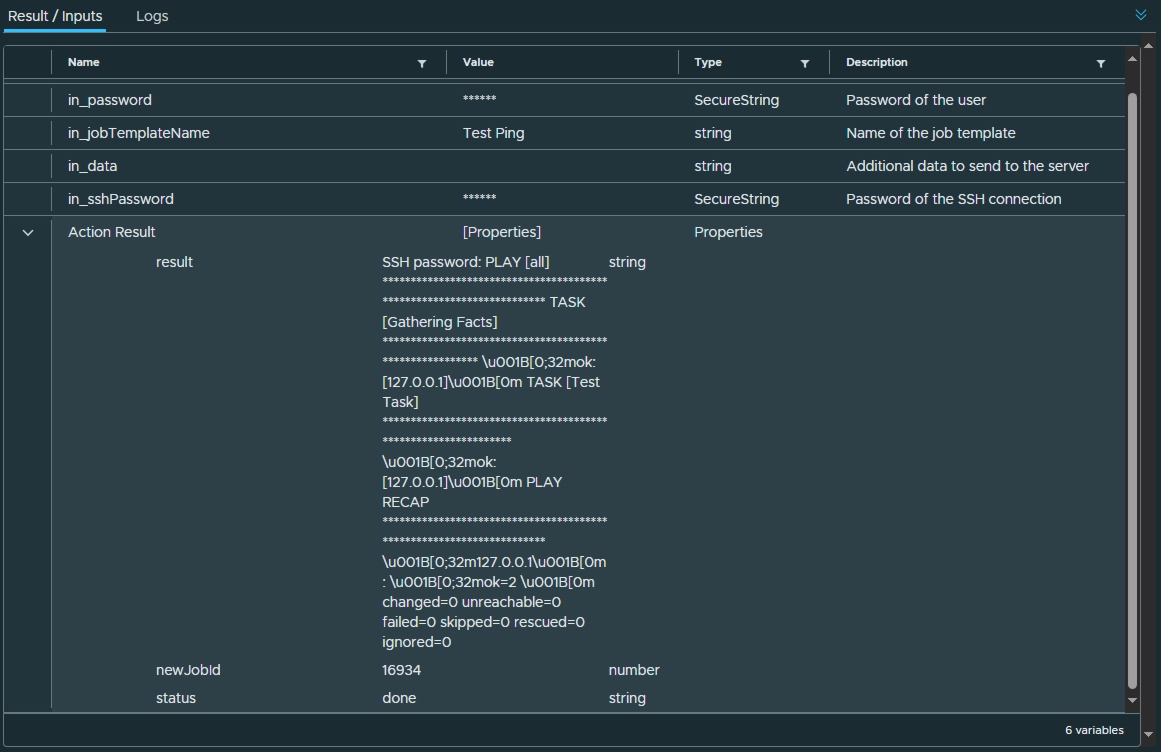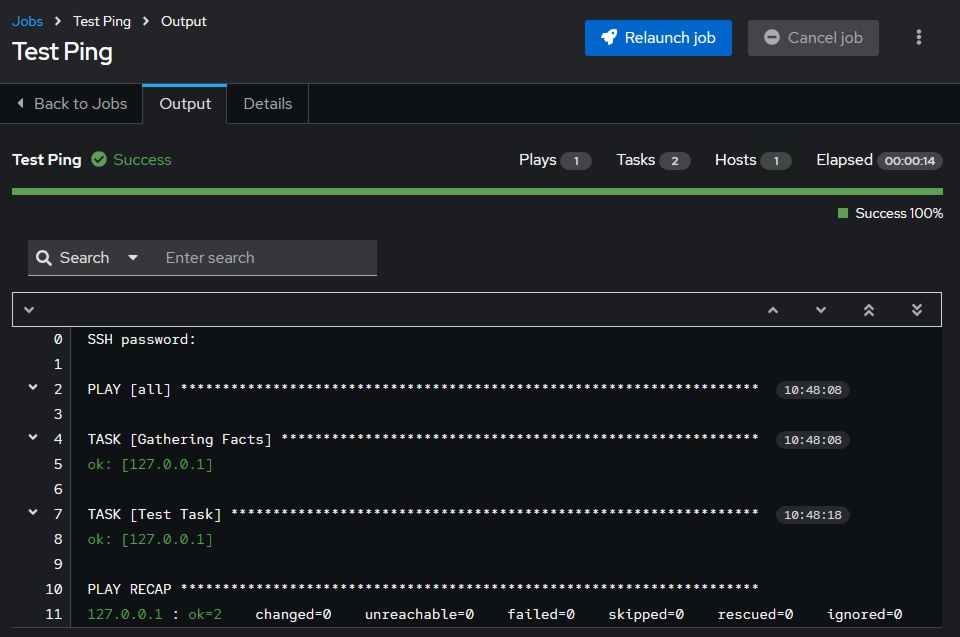"""
Ansible job monitor
@author Stefan Schnell <mail@stefan-schnell.de>
@version 0.4.0
@param {string} in_userName - Name of the user
@param {SecureString} in_password - Password of the user
@param {string} in_jobTemplateName - Name of the job template
@param {string} in_data - Additional data to send to the server
@param {SecureString} in_sshPassword - Password of the SSH connection
@outputType Properties
"""
import ast
import base64
import json
import ssl
import time
import urllib.request
def ansibleApiCall(
userName: str,
userPassword: str,
apiCall: str,
method: str = "GET",
data: str | None = None
) -> dict | bytes | None:
url: str = "https://yourAnsibleAutomationPlatformURL"
url += apiCall
response: http.client.HTTPResponse | None = None
result: dict | bytes | None = None
try:
request = urllib.request.Request(
url = url,
method = method,
data = data
)
authorization: str = base64.b64encode(
bytes(userName + ":" + userPassword, "UTF-8")
).decode("UTF-8")
authorization = "Basic " + authorization
request.add_header("Authorization", authorization)
request.add_header("Content-Type", "application/json")
response = urllib.request.urlopen(
request,
context = ssl._create_unverified_context()
)
responseCode: int = response.status
responseRead: bytes = response.read()
if (
responseCode == 200 or
responseCode == 201 or
responseCode == 202 or
responseCode == 204
):
if len(responseRead) > 0:
result = json.loads(responseRead)
else:
result = response
except Exception as err:
print(err)
finally:
if response is not None:
response.close()
return result
def jsonStringToDict(
jsonString: str
) -> dict:
jsonDict: dict = {}
try:
jsonDict = json.loads(jsonString)
except:
try:
jsonDict = ast.literal_eval(jsonString)
except Exception as err:
raise Exception("An error occurred at " + \
"JSON string to dictionary") from err
return jsonDict
def getIdOfJobTemplate(
userName: str,
userPassword: str,
jobTemplateName: str
) -> int:
templates: str = str(
ansibleApiCall(
userName,
userPassword,
"/api/controller/v2/job_templates/?page_size=100"
)
)
templates: dict = jsonStringToDict(templates)
for template in templates["results"]:
if (template["name"] == jobTemplateName):
return template["id"]
def launchJobTemplate(
userName: str,
userPassword: str,
templateId: str,
data: str | None = None
) -> dict:
result: str = str(
ansibleApiCall(
userName,
userPassword,
"/api/controller/v2/job_templates/" + templateId + "/launch/",
"POST",
data.encode()
)
)
return jsonStringToDict(result)
def getJobOutput(
userName: str,
userPassword: str,
jobId: str
) -> dict:
result: str = str(
ansibleApiCall(
userName,
userPassword,
"/api/controller/v2/jobs/" + jobId + "/stdout/?format=json"
)
)
return jsonStringToDict(result)
def handler(context: dict, inputs: dict) -> dict:
outputs: dict = {}
userName: str = inputs["in_userName"]
userPassword: str = inputs["in_password"]
nameOfJobTemplate: str = inputs["in_jobTemplateName"]
jobTemplateId: int = getIdOfJobTemplate(
userName,
userPassword,
nameOfJobTemplate
)
# data: str = None
# if inputs["in_data"]:
# data = "{" + inputs["in_data"] + "}"
data: str = '{"credential_passwords": {"ssh_password": "' + \
inputs["in_sshPassword"] + '"}}'
newJob: dict = launchJobTemplate(
userName,
userPassword,
str(jobTemplateId),
data
)
newJobId: int = newJob["id"]
jobStatus: str | None = None
while (
jobStatus == None or
jobStatus == "running" or
jobStatus == "pending" or
jobStatus == "waiting"
):
jobSummary: str = str(ansibleApiCall(
userName,
userPassword,
"/api/controller/v2/jobs/" + str(newJobId)
))
jobSummary: dict = jsonStringToDict(jobSummary)
jobStatus: str = jobSummary["status"]
time.sleep(0.125)
print(".", end = "")
print("\nJob with Id " + str(newJobId) + " done")
result: dict = getJobOutput(
userName,
userPassword,
str(newJobId)
)
outputs = {
"status": "done",
"newJobId": newJobId,
"result": result["content"]
}
return outputs
|


